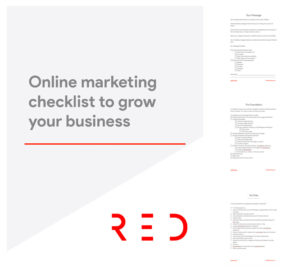If there is one thing we can learn from this year’s elections it’s the fact that we’re being lied to and manipulated by the media, campaign managers, candidates, and polls.
It’s like sheep being led to the slaughter. We tend follow the crowds.
With modern technology and communication channels, everyone and anything can become a news source. Everyone can get some attention.
Just take a look at your Facebook feed. There’s an endless amount of posts being shared by your friends and family that have zero truth to them. Nothing is verified. Nothing is proven. We assume because it’s posted, it must be true.
Those false messages are then passed on and people make their decisions based off of what they are reading and seeing. It’s the blind leading the blind.
This doesn’t just happen in politics. It happens in every industry. The danger comes because we’re led down paths of false information, and then we make manipulated business decisions. We ought to be smarter, especially as business owners and marketers.
Remain skeptical at all times. Marketers should be the most difficult people to whom to market, but even we can be bamboozled. Ask yourself: How much money will this person or company make by popularizing this idea? Whenever marketers claim that “everything has changed” or that something is “dead” or that some new buzzword “is the future of marketing,” ask for evidence. Make them cite their sources and explain their reasoning. Most of the time, they are just full of it.
There’s an endemic tendency to reinvent the past by creating new concepts that define marketing tactics. Some examples of specific tactics could be:
-The more content you produce the more sales you will make. “Content is King”
-Collect as many emails as possible. “The Money is in the List.”
-Inbound Marketing
-You should participate in every single social media platform. “Social Media Marketing.”
-Search Engine Optimization
-Number one position on Google
These new concepts can be used for good and bad, but whatever your specific tactics are, there is good strategy and implementation, as well as the opposite.
I don’t want you to agree or disagree with me until you get to the end. Media buyers are going to hate what I have to say about the fraud that is taking place. SEO gurus are going to disagree that their industry is rigged with scams and PPC experts will argue that everyone should be using PPC.
We tend to agree or disagree with what our current beliefs are, and from there we tend to try and defend our current actions. But if your beliefs are incorrect, you become a danger to your clients and your business. The truth will set you free.
Here are 4 Marketing Scams you should watch out for.
(Look forward to my next blog where I will give you simple practical ideas to make sure you do not fall victim.)
The problem with Media Buys
Nothing screams “scam” more than large media buys. The industry has been plagued with fraud since the beginning and they still have not fixed it. It’s too lucrative.
- Half of paid online display ads have never been seen by a human.
- Agencies get kickbacks from display networks.
- Bot traffic is used to trick the advertisers out of more money and to increase the
bottom line of both the agency and the network.
Every big ad agency is pushing huge media buys because they are simple to sell, easy to set up, and profitable. We assume that the right people will see our ads at the right time. This doesn’t happen. Don’t be so gullible!
In 2015 the Interactive Advertising Bureau (IAB) commissioned EY’s Media and Entertainment Advisory to conduct a large study on Media buys. Click here for the full PDF study.
The conclusion is that businesses are being scammed out of 8.2 billion dollars a year. Most of these ads are not seen, ad blockers are working, and bots are using up most of your ad spend.
I’ve seen this first hand. I’v dealt with companies that were convinced into purchasing large media buys. During the run periods they received small amounts of traffic for the amount they spent, plus the traffic did not result in a purchase. It was all junk.
The Problem With Social Media ads
Social media ads include Facebook, Twitter, Snapchat, Linkedin, etc. I’ve tested them all and found Facebook to be the most reliable.
Linkedin and twitter were an absolute Joke. Before you purchase an ad on their platform, think twice. If you are reading this article and you’ve found a way to produce actual revenue on Linkedin, twitter or Snapchat, shoot me an email. Because I’ve yet to find anyone who
can make the numbers work.
So that leaves us with Facebook. Facebook does work, but it has its flaws. Take video views.
When running a simple video campaign, Facebook counts a video view when someone watches 3 seconds of your video. Clearly that isn’t a view. Yet we allow Facebook to continue to charge us.
As you scroll down through your feed, the videos play automatically, so basically you are paying as people pass by your video ads. Doesn’t make sense. But Facebook has to produce profits, so they will find little gimmicks to milk money from advertisers.
Shareholders, who want to see profits, control Facebook. Profits are created by ad spend. The more advertisers buy into their system the more they will make.
So…
They sell the public on likes, views, and clicks and the FOMO (fear of missing out) to sign up large agencies.
So far, it has worked. Facebook’s profits continue to soar, but are companies really getting an ROI from Facebook ads?
Here are some of the issues:
-AD load
-Dummy Accounts (mostly fake accounts are being set up)
-Pay to Play (your posts are only seen if you pay to have them seen)
-It’s mainly a mobile platform (not a lot of purchases happen on Mobile)
Take a quick glance at your news feed. 8 out of 10 posts are propaganda and sponsored ads. It’s killing the user experience and a lot of people are dropping Facebook. Facebook has a HUGE ad load problem.
Facebook is running out of inventory which means ad costs will go up and advertisers and users will stop using Facebook. It’s a double edged sword.
Take a look at what Kurk Wagner had to say.
“Facebook makes mountains of money through advertising — $6.2 billion last quarter alone, to be specific. Facebook is about to max out on the number of ads it can show users inside its flagship product, which means it will need to find other ways to grow the company’s ad business moving forward. Simply increasing the number of ads it shows people will not be an option.”
So before you spend your 2017 budget on Facebook on Social media ads, realize that likes, clicks, and views are not what they seem.
The Problem With Pay Per Click
I’m a huge fan of Pay Per Click, but the costs continue to increase, plus it’s jammed packed with Click Fraud. Click Fraud can be:
-Competitors clicking on your ads
-Kids accidently clicking on you ads
-Ads showing up for keywords that have zero to do with your business.
-Paying for you own brand domain name and keywords
These are just a few. When the cost per click gets around $80, there is a lot of money on the line. Amateurs can blow a budget rather quickly. Because a lot Click Fraud can be prevented from if you know what you are doing.
For more information, I wrote a simple article a few months back that goes into PPC with a little more detail. (http://marketinghy.com/2015/02/compete-ppc- pay-per- click-small-budget/)
The Problem With SEO
We all want to be on “page one of Google,” but at what cost? If you are like me, you get non-stop emails saying they can put your website on page one of Google.
SEO companies are notorious for bringing on a bunch of clients, taking their money for a couple of months, and then closing up shop because they received so many bad reviews.
SEO takes a lot of great content and high quality backlinks. There’s no other way around it.
So now that we have identified what Marketing Scams you need to look out for, it’s time we show you how to conquer them.
There’s a simple remedy for each one, but that is going to come in our next blog.
I’m tired and need some rest.

